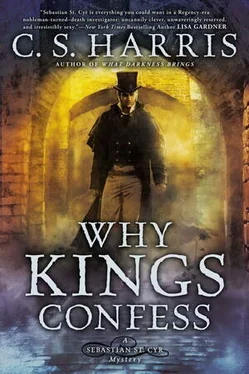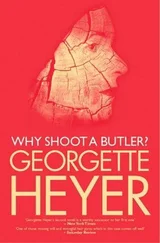C. Harris - Why Kings Confess
Здесь есть возможность читать онлайн «C. Harris - Why Kings Confess» весь текст электронной книги совершенно бесплатно (целиком полную версию без сокращений). В некоторых случаях можно слушать аудио, скачать через торрент в формате fb2 и присутствует краткое содержание. Год выпуска: 2014, Издательство: Penguin Group US, Жанр: Исторический детектив, на английском языке. Описание произведения, (предисловие) а так же отзывы посетителей доступны на портале библиотеки ЛибКат.
- Название:Why Kings Confess
- Автор:
- Издательство:Penguin Group US
- Жанр:
- Год:2014
- ISBN:нет данных
- Рейтинг книги:5 / 5. Голосов: 1
-
Избранное:Добавить в избранное
- Отзывы:
-
Ваша оценка:
- 100
- 1
- 2
- 3
- 4
- 5
Why Kings Confess: краткое содержание, описание и аннотация
Предлагаем к чтению аннотацию, описание, краткое содержание или предисловие (зависит от того, что написал сам автор книги «Why Kings Confess»). Если вы не нашли необходимую информацию о книге — напишите в комментариях, мы постараемся отыскать её.
Why Kings Confess — читать онлайн бесплатно полную книгу (весь текст) целиком
Ниже представлен текст книги, разбитый по страницам. Система сохранения места последней прочитанной страницы, позволяет с удобством читать онлайн бесплатно книгу «Why Kings Confess», без необходимости каждый раз заново искать на чём Вы остановились. Поставьте закладку, и сможете в любой момент перейти на страницу, на которой закончили чтение.
Интервал:
Закладка:
“A year, perhaps more. As a woman, of course, she cannot be licensed to practice medicine here and is only allowed to act as a midwife. But she is a good woman. She does what she can to help those in the French community.”
Again, Sebastian’s gaze met Gibson’s. “I wonder how she came to know Pelletan,” he said quietly.
The dead child’s mother began to weep again, clutching her ragged shawl about her and rocking back and forth.
Sebastian reached out, awkwardly, to touch her thin shoulder. “Again, madam, our heartfelt condolences for your loss, and our apologies for disturbing you at such a time.”
She sniffed, her spine stiffening with an echo of a pride long worn down and effaced. “Merci, monsieur,” she said, holding out the coins he had given her. “But I cannot accept your charity.”
He made no move to take the money. “It’s not mine. The doctoresse asked me to give it to you.”
He could tell by the narrowing of her eyes that she knew it for a lie. But it was a lie she was obviously desperate enough to accept, because she swallowed hard and nodded, her gaze sliding away as she said, “Merci.”
They were retracing their steps back down the dank, noisome corridor when they heard the door jerk open behind them again.
“Messieurs,” she called out, stopping them. “You asked about Damion Pelletan?”
They turned toward her again. “Yes. Why?”
She scrubbed the heel of one thin hand over her wet cheeks. “When he and the doctoresse were here last night, for Cecile. . I heard them talking. I did not pay attention to most of what was said, but one name they mentioned several times leapt out at me.”
“What name is that?”
“Marie-Therese, the Duchesse d’Angouleme.”
Gibson stared at her. “You mean the daughter of Marie Antoinette and King Louis XVI of France?”
“Yes.”
Sebastian said, “What about Marie-Therese?”
The woman shook her head. “I did not hear most of what was said-my attention was all for Cecile. But I believe they were discussing a meeting between Damion Pelletan and the Princess. A meeting that worried Alexandrie Sauvage.”
Chapter 9
“H ow much do you know about Marie-Therese?” Sebastian asked Gibson as they walked up St. Katharine’s Lane toward the looming bulk of the parish’s decrepit medieval church.
Gibson frowned. “Not much. I know she was thrown into the Temple Prison with her parents during the Revolution and kept there even after the King and Marie Antoinette were sent to the guillotine. But that’s about it. Her brother died there, didn’t he?”
“So they say. But for some reason I’ve never entirely understood, the revolutionaries allowed Marie-Therese to live. When she was seventeen, they released her to the Austrians in exchange for some French prisoner of war.”
“And now she’s here in England?”
Sebastian nodded. “Most of the French royal family is here-or at any rate, what’s left of it. Louis XVI’s youngest brother, Artois, has a house on South Audley Street. But the rest live on a small estate out in Buckinghamshire.”
“What’s the older brother’s name-the one who’s so heavy he can hardly walk?”
“That’s Provence.”
Although princes of the blood, the two surviving brothers of Louis XVI were both generally known by the titles given them at birth, the Comte de Provence and the Comte d’Artois. Both had fled France early in the Revolution, but whether one saw their flights as cowardly or wise tended to reflect one’s politics.
As a female, Marie-Therese was barred by French law from inheriting her father’s crown. But after her release from prison, she had married her first cousin, the Duc d’Angouleme, third in line to the French throne behind his childless uncle and his own father. Thus, as Angouleme’s wife, Marie-Therese would someday become Queen of France-if there was a restoration.
Earnest and plodding, Angouleme was said to be not nearly as bright as his wife. The last Sebastian had heard, the young French prince was off with Wellington in Spain, while Artois was with his latest mistress up in Edinburgh. But there were more than enough Bourbons and their hangers-on around London to cause mischief.
“So what’s she like, this princess?” Gibson asked.
“Very devout, like her father, Louis XVI. Arrogant and proud, like her mother, Marie Antoinette. And slightly mad, thanks to her experiences during the Revolution. She has devoted her life to the restoration of the Bourbons and the punishment of those she holds responsible for the deaths of her family. I’ve heard it said she’s convinced it is God’s will that the Bourbons will someday be restored to France.”
“And the Revolution and Napoleon are-what? Just an unpleasant interlude?”
“Something like that.”
They paused before the church of St. Katharine’s, Sebastian tipping back his head to let his gaze drift over the west end’s soaring buttresses and delicately hued stained glass windows. Time and shifting politics had not been kind to the graceful old structure. The roof beams sagged; tufts of moss and grass grew from the crumbling stone facade, and black holes showed where visages of saints had in better days smiled down upon the common people. Once, this had been the chapel of a religious community founded and patronized by the queens of England. Then had come Reformation, civil war, revolution, and neglect.
“What?” asked Gibson, watching him.
“I was thinking about revolutions and queens.”
Gibson shook his head, not understanding.
“If England were to make peace with France now, then Napoleon would remain Emperor. I can’t see that going down well with Louis XVI’s daughter. She wants revenge on the men who murdered her mother and father, and she has ambitions of someday becoming Queen of France herself.”
“So what the bloody hell was she doing meeting with a man who formed part of a French peace delegation?”
“It is curious, is it not?” Sebastian turned away from the ancient, soot-stained church. “I think I’d like to have a chat with Madame Sauvage’s servant. Where did you say she lives? Golden Square?”
Gibson nodded. “You can tell her that her mistress is doing as well as can be expected.”
“When will she be out of danger?”
Gibson stared out over the rows of mossy tombstones in the swollen churchyard beside them. “I wish I knew,” he said, his face looking bleak and drawn. “I wish I knew.”
• • •
Lying some blocks to the east of Bond Street, Golden Square had never been particularly fashionable. Built in the waning days of the Stuarts, its varied rooflines were more reminiscent of eighteenth-century Parisian hotels or the decorative gables of Amsterdam than of London town houses. Once, it had been home to foreign ambassadors and artists. But a dull, dingy look had long ago settled over the area, with many of the seventeenth-century brick and stucco houses broken up into lodgings.
Sebastian spent some time talking to vendors and shopkeepers around the square, including a butler, an apothecary, and one stout, middle-aged woman with a gummy smile who sold eel pies from a stall. Madame Sauvage seemed to be a well-liked figure in the neighborhood, although no one knew much about her.
“She’s a deep one,” said the eel seller, giving Sebastian a wink. “Friendly enough, but keeps herself to herself, for all that.”
The Frenchwoman’s rooms lay on the attic floor of a four-story, gable-fronted house near the corner of Upper James Street. Sebastian’s knock was answered by a plain, heavyset woman with iron gray hair and a knobby nose who peered at him suspiciously, her gaze traveling over him with obvious disapproval.
Читать дальшеИнтервал:
Закладка:
Похожие книги на «Why Kings Confess»
Представляем Вашему вниманию похожие книги на «Why Kings Confess» списком для выбора. Мы отобрали схожую по названию и смыслу литературу в надежде предоставить читателям больше вариантов отыскать новые, интересные, ещё непрочитанные произведения.
Обсуждение, отзывы о книге «Why Kings Confess» и просто собственные мнения читателей. Оставьте ваши комментарии, напишите, что Вы думаете о произведении, его смысле или главных героях. Укажите что конкретно понравилось, а что нет, и почему Вы так считаете.












